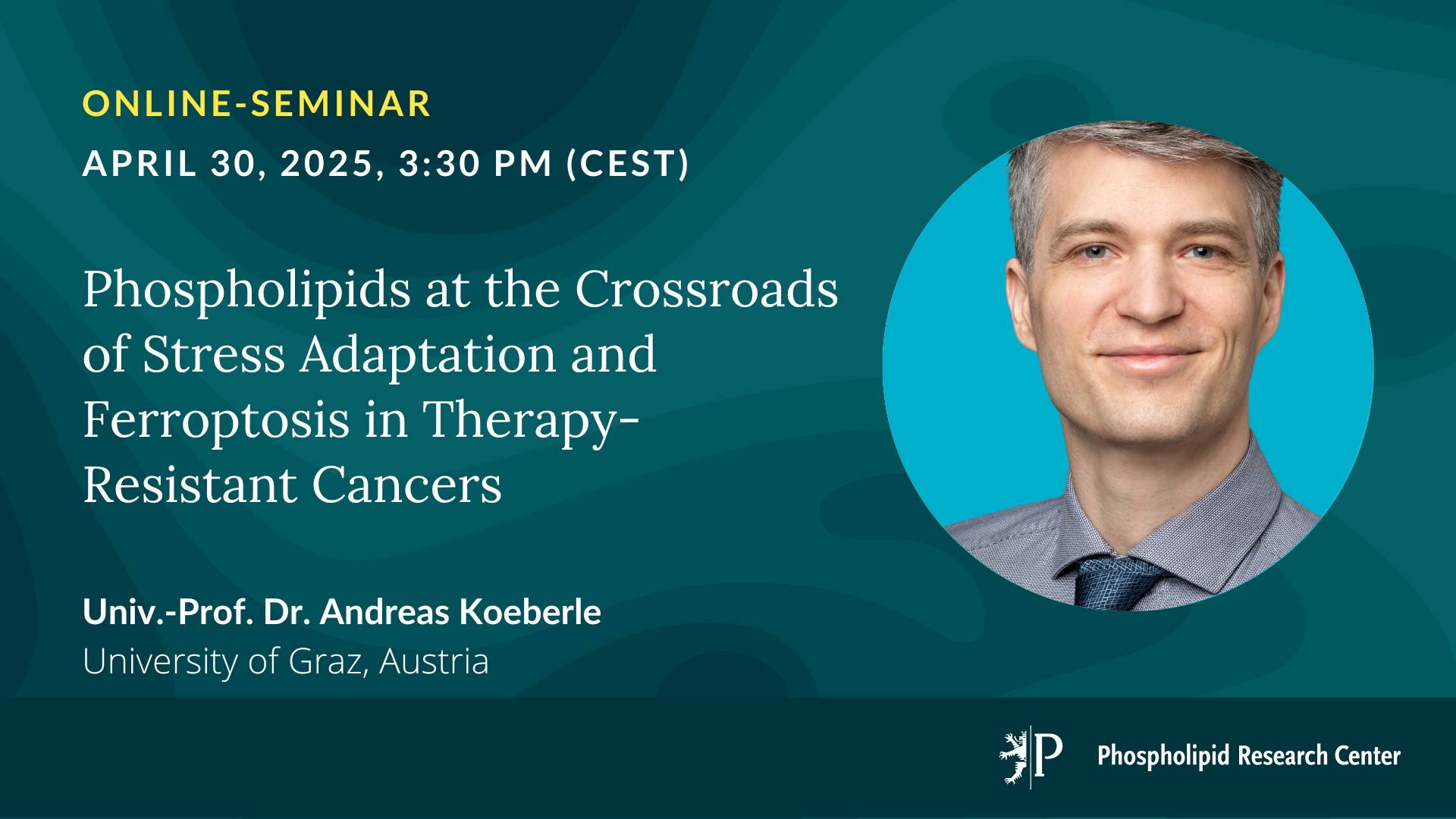Webinar April 2025 – Prof. Koeberle
On Wednesday, April 30, 2025, an online seminar on "Phospholipids at the Crossroads of Stress Adaptation and Ferroptosis in Therapy-Resistant Cancers" was held at 3.30 p.m. (CEST).

The speaker was Univ.-Prof. Dr. Andreas Koeberle from University of Graz, Austria.
If you are interested in the slides of the presentation, please get in touch with us!
Abstract
Cell-fate decisions are influenced by changes in phospholipid metabolism that play crucial roles in both health and disease. Beyond their essential roles in compartmentalization and energy storage, certain low-abundance phospholipid species function as signaling molecules – acting as second messengers or lipokines – that critically regulate processes such as programmed cell death [1, 2]. Exploiting the mechanistic diversity of cytotoxic natural products, we employ functional multiomics to dissect lipid-driven regulatory mechanisms. This approach has proven particularly valuable in studying metabolically regulated cell death pathways like ferroptosis, characterized by excessive membrane peroxidation leading to membrane disruption. Ferroptosis induction holds promise as an anti-cancer strategy, particularly for targeting EMT-driven metastatic and therapy-resistant cancers, with mesenchymal-type persister cells displaying heightened sensitivity [3]. This presentation will illustrate how we identified the phospholipid metabolic mechanisms underlying this enhanced ferroptosis sensitivity [4] and will reveal a mechanism through which various cytotoxic stressors amplify membrane peroxidation – a process intrinsic to most cell death programs [5]. Lastly, we will share initial findings from our drug discovery pipeline, which aims to harness this sensitizing mechanism for anti-cancer combination therapies.
References
[1] Understanding the diversity of membrane lipid composition. Harayama T, Riezman H, Nat. Rev. Mol. Cell Biol. 2018; 19:281-296. https://doi.org/10.1038/nrm.2017.138
[2] PI(18:1/18:1) is a SCD1-derived lipokine that limits stress signaling. Thürmer M, Gollowitzer A, Pein H, Neukirch K, Gelmez E, Waltl L, Wielsch N, Winkler R, Löser K, Grander J, Hotze M, Harder S, Döding A, Meßner M, Troisi F, Ardelt M, Schlüter H, Pachmayr J, Gutiérrez-Gutiérrez Ó, Rudolph KL, Thedieck K, Schulze-Späte U, González-Estévez C, Kosan C, Svatoš A, Kwiatkowski M, Koeberle A, Nat. Commun. 2022; 13:2982. https://doi.org/10.1038/s41467-022-30374-9
[3] Ferroptosis-modulating small molecules for targeting drug-resistant cancer: Challenges and opportunities in manipulating redox signaling. Koeberle SC, Kipp AP, Stuppner H, Koeberle A, Med. Res. Rev. 2023; 43:614. https://doi.org/10.1002/med.21933
[4] Zeb1 mediates EMT/plasticity-associated ferroptosis sensitivity in cancer cells by regulating lipogenic enzyme expression and phospholipid composition. Schwab A, Rao Z, Zhang J, Gollowitzer A, Siebenkäs K, Bindel N, D'Avanzo E, van Roey R, Hajjaj Y, Özel E, Armstark I, Bereuter L, Su F, Grander J, Bonyadi Rad E, Groenewoud A, Engel FB, Bell GW, Henry WS, Angeli JPF, Stemmler MP, Brabletz S, Koeberle A, Brabletz T, Nat. Cell Biol. 2024; 26:1470-1481. https://doi.org/10.1038/s41556-024-01464-1
[5] Attenuated growth factor signaling during cell death initiation sensitizes membranes towards peroxidation. Gollowitzer A, Pein H, Rao Z, Waltl L, Bereuter L, Loeser K, Meyer T, Jafari V, Witt F, Winkler R, Su F, Große S, Thürmer M, Grander J, Hotze M, Harder S, Espada L, Magnutzki A, Gstir R, Weinigel C, Rummler S, Bonn G, Pachmayr J, Ermolaeva M, Harayama T, Schlüter H, Kosan C, Heller R, Thedieck K, Schmitt M, Shimizu T, Popp J, Shindou H, Kwiatkowski M, Koeberle A, Nat. Commun. 2025; 16:1774. https://doi.org/10.1038/s41467-025-56711-2
